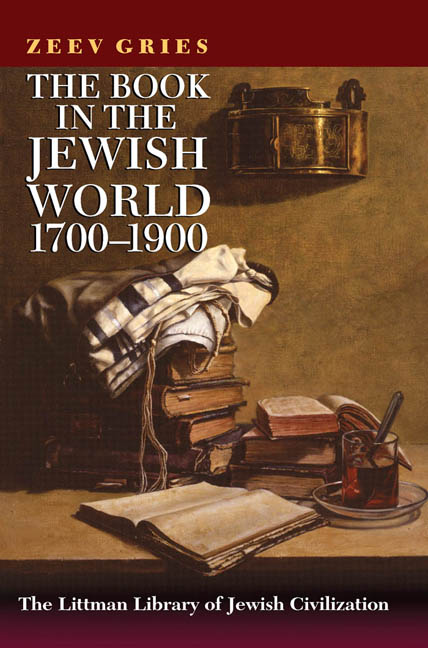Book contents
- Frontmatter
- Dedication
- Preface to the English Edition
- Contents
- List of Illustrations
- Note on Bibliographical Conventions and Transliteration
- Introduction
- PART I THE AWAKENING OF THE NASCENT INTELLIGENTSIA
- 1 Expanding Horizons
- 2 On Reading and Readers
- 3 Elite Literature: Halakhic Works and Textual Commentaries
- 4 Ethical Literature in Hebrew and Yiddish
- 5 On Libraries Private and Public
- 6 Kabbalistic Literature and its Role in Hasidism
- 7 Literature for Women and Children Only, or for Everyone?
- PART II THE BOOK: GUARDIAN OF THE SACRED OR HERALD OF SECULARIZATION?
- Afterword: The Revolution in the World of Hebrew Books at the Start of the Twentieth Century
- Appendix: The Young Abraham Ya'ari
- Bibliography
- Index of Books and Periodicals
- Index of Places
- Index of People
- Index of Subjects
2 - On Reading and Readers
from PART I - THE AWAKENING OF THE NASCENT INTELLIGENTSIA
- Frontmatter
- Dedication
- Preface to the English Edition
- Contents
- List of Illustrations
- Note on Bibliographical Conventions and Transliteration
- Introduction
- PART I THE AWAKENING OF THE NASCENT INTELLIGENTSIA
- 1 Expanding Horizons
- 2 On Reading and Readers
- 3 Elite Literature: Halakhic Works and Textual Commentaries
- 4 Ethical Literature in Hebrew and Yiddish
- 5 On Libraries Private and Public
- 6 Kabbalistic Literature and its Role in Hasidism
- 7 Literature for Women and Children Only, or for Everyone?
- PART II THE BOOK: GUARDIAN OF THE SACRED OR HERALD OF SECULARIZATION?
- Afterword: The Revolution in the World of Hebrew Books at the Start of the Twentieth Century
- Appendix: The Young Abraham Ya'ari
- Bibliography
- Index of Books and Periodicals
- Index of Places
- Index of People
- Index of Subjects
Summary
IN RECENT YEARS there has been increasing interest in the culture of reading and in the reading habits of various populations. However, even what is perhaps the major work on the history of reading in the West has only one chapter, by Robert Bonfil at the Hebrew University of Jerusalem, which discusses the reading of books among the Jews in the Middle Ages. The period with which we are concerned, the eighteenth and nineteenth centuries, receives no attention at all.
Scholars of non-Jewish European culture are fortunate in having access to catalogues of book fairs for the eighteenth century, and to the inventories of booksellers, although these alone are not enough to determine reading habits and the way in which reading influenced people's lives.To supplement information gleaned from the catalogues, historians make use of the memoirs of those who wrote about their reading experience. But what of the Jews in the eighteenth and nineteenth centuries? Our main sources are the contents of large libraries and private collections as recorded by bibliographers. These provide information on the numbers of titles and new editions, and permit classification by genre.They do not, however, tell us anything about the number of books printed. It is well known that books required for traditional religious and educational purposes in a formal setting were printed in large quantities—for example, the tractates of the Talmud, the Pentateuch, and the daily and festival prayer books—but little is known about other books.There is somewhat greater knowledge of books in the nineteenth century thanks to the spread of the Haskalah movement, which promoted books in its periodicals through announcements and book reviews, and the printers, publishers, and booksellers associated with the movement put out catalogues of their wares.
In the eighteenth century books were purveyed to the Jewish community by itinerant salesmen, some of whom were penniless writers, some virtually beggars, and others pedlars who sold their books alongside haberdashery and the like. These people played a key role in the distribution of popular literature, and continued to do so into the nineteenth century. This explains why one of the greatest Jewish writers, Shalom Jacob Abramowitsch (1835–1917) took the pen-name of Mendele Mokher Seforim (‘Mendele the book salesman’).
- Type
- Chapter
- Information
- The Book in the Jewish World, 1700–1900 , pp. 20 - 34Publisher: Liverpool University PressPrint publication year: 2007

